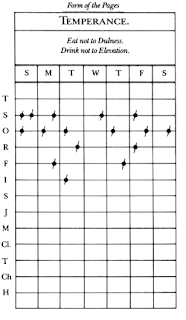(Not an actual photo of John Woolman)
In spite of my history with the Friends movement, I hadn't even heard of John Woolman until comparatively recently. So, for the sake of those out there who may, likewise, not know of him, John Woolman was a Quaker in New Jersey (although often traveling) in colonial America in the generation following William Penn. Pretty much contemporary with Ben Franklin, although slightly shorter lived. Indeed, one of Woolman's original tracts appears to have been printed by Franklin's press. Perhaps the most notable aspect of Woolman's life to most historians is that he was one of the earliest abolitionists. He seems to have started as an advocate of teaching slaves to read (and people freaked out!) but then moved on to trying to convince slave-holding Friends that owning slaves was inconsistent with Christianity (and people freaked out!) He spent most of his life attempting to convince other Friends of the cause and, indeed, Quakers are known as the first religious movement in America to officially take an anti-slavery stand. John Woolman was instrumental in effecting that outcome.
In fact, he also travelled to England to speak on the matter to Quakers over there. I have no evidence of any direct influence, but it is possibly worth noting that John Woolman was in London, influencing the religious community against slavery, about eight years before William Wilberforce entered Parliament. Thomas Clarkson was in communication with the Quakers over the abolition of the slave trade and they expressed their belief in the need for a voice in Parliament, so it's not out of the question to suggest that this lowly tailor/shopkeep from Jersey may have directly influenced the actual (albeit eventual and long after his death) abolition of the slave trade. I would also add as a historical point of trivia, the circle kind of completes itself in that William Wilberforce did travel to Paris early in his career and meet Benjamin Franklin. There you go. Trot that little tidbit out at your next cocktail party.
While the journal deals largely with these efforts, I would say that the overall theme or message of John Woolman's Journal is that of Christian integrity, which is to say making sure that Christ's love, grace, and compassion is reflected in all aspects of life. Be it your money, your social life, your opinions, even your clothing, do all to the glory of God and loving your neighbor. None of this is taken in a legalistic direction. He doesn't tell you what you should and shouldn't wear or how to speak or what to do when. Quite the contrary, he seeks to do everything out of love, grace, and compassion. He shares his own convictions and how he came to hold to them. He is not prescribing a set of actions. He's advocating a way of seeing. He seeks to apply those principles (love, grace, and compassion) to every aspect of his life and, I think, comes away with a sort of "Whole Christian" lifestyle where one does not leave loving God and one's neighbor at the door no matter what one does. In modern terms, it might be called Social Justice or Social Works, but it pours out from the abundance of the heart. He meditates on everything through that filter and seeks to be diligent in his Christian integrity. It is a remarkable book and one that I think will turn out to be a tremendous influence on me.
Of course,Woolman readily identified the institution of slavery as inconsistent with Christianity. (Strangely enough in hindsight, when he would confront Quakers who owned slaves, he would often argue from the standpoint of being against sloth, laziness, and profiting off of the labor of others.) But it doesn't nearly end there. He had a heart for the Native Americans and would travel to meet with them to attempt to extend Christian love to them. It was a fruitful endeavor and, in some of the most tender passages of the book, he was able to extend a hand of loving-kindness to a group who were treated with great injustice.
It's probably worth noting that the Friends movement is traditionally pacifist and there is some talk about refusing to pay war taxes. (This is back when they had specific taxes, not one big lump of "Taxes" which could pay for things you find essential and good as well as those you find abominable and evil) It is probably also worth noting that we are talking about the French and Indian War where Great Britain, back when they were Empiring out all over the place, fought the French and Native Americans on North American soil. Woolman does not leave his Christianity at the door in reference to the war.
Woolman talks about the rum business which on the front end was entirely from the labor of slaves and, on the other end, often used to exploit the Native Americans who were forced from their land to scramble for pelts in different and difficult areas, only to have rum heavily pushed on them when they traded them to the European Imperialists (which am us). He writes, "Where cunning people pass counterfeits and impose on others that which is good for nothing, it is considered as wickedness; but for the sake of gain to sell that which we know does people harm, and which often works their ruin, manifests a hardened and corrupt heart, and is an evil which demands the care of all true lovers of virtue to suppress."
He may as well be writing about contemporary America! He may as well be writing about what brought about our current economic collapse!
Woolman understands the concept of "casting your economic vote" with every dollar you spend and endeavors to be conscientious, frugal, and a good steward in every way possible in what he purchases. "It had been my general practice to buy and sell things really useful. Things that served chiefly to please the vain mind in people, I was not easy to trade in; seldom did it; and whenever I did I found it weaken me as a Christian."
He lived very modestly. When he went to England, he traveled in steerage with the sailors instead of the more luxurious passenger areas. He even got a Quaker meeting going on the boat.
He also gives strong arguments against cruelty to animals. "I believe where the love of God is verily perfected, and the true spirit of government watchfully attended to, a tenderness towards all creatures made subject to us will be experienced, and a care felt in us that we do not lessen that sweetness of life in the animal creation which the great Creator intends for them under our government."
He also talks about the divide between the wealthy and the poor. He talks about the virtue of living modestly and of the rich seeking to elevate the poor while condescending in their own luxury for the sake of equality. I especially appreciated this part. "And here luxury and covetousness, with the numerous oppressions and other evils attending them, appeared very afflicting to me, and I felt in that which is immutable that the seeds of great calamity and desolation are sown and growing fast on this continent!" (emphasis mine) And this was in the 1760s! He may just as well be speaking about modern America. Indeed, I think we are currently reaping the fruits of those seeds of great calamity and desolation that Woolman saw planted in the early days of our nation. In fact, this was even pre-Revolution.
In a section that may seem a bit quaint to modern readers, he talks about the wearing of clothes with dyes that are harmful to the garment. At first I thought he was speaking in metaphor, but then he gives an account of people who questioned him when he started wearing non-dyed clothes, worrying that he was just being eccentric. I came to understand that he was talking about good stewardship with one's money as the dyes in question were for the sake of good looks (vanity) and that they weakened the articles of clothing in some capacity. He also mentions, spiritualizing it a bit, that the dyes hide dirt and he was really uncomfortable with that. He wanted to be genuinely clean, not just to give the appearance of being clean.
I think there is also a lesson in here about one's position in life, never underestimating where Providence has placed you, and being diligent in the Good Work of this world. He mentions at one point in his young life he may have liked "something greater" than the life of a tailor/store-clerk, but that he contented himself with the happiness found in humility. It struck me because he wrote those words in the 1740s and here I was reading his words in 2010.
One of the sadder parts of the book is a short section where he mentions in passing some qualms he had over the smallpox vaccine. He had seen some die from the vaccine. (He wrote that particular passage about 2 years after the death of Jonathan Edwards which he undoubtedly would have heard about. Edwards, as you well know, died due to complications from his smallpox inoculation.) Woolman says that he expects that scientific advances would, in his opinion, advance against the disease and would more likely make inoculation safer as time went on.It did. In fact, the vaccine eventually eradicated the disease from the world. Unfortunately for Woolman, he did not get to experience the benefits of the vaccine. He died quite suddenly of smallpox on his journey in England.
I would highly highly highly recommend this book to everyone. Of the three books of virtue I've recently gone through (Franklin's Autobiography, Penn's Some Fruits of Solitude, and now this), this was by far my favorite. I would venture a guess that it may end up being the most influential on me as well.


















